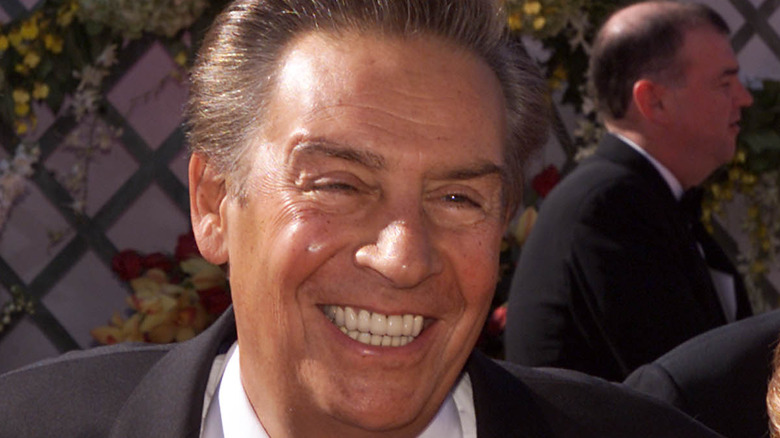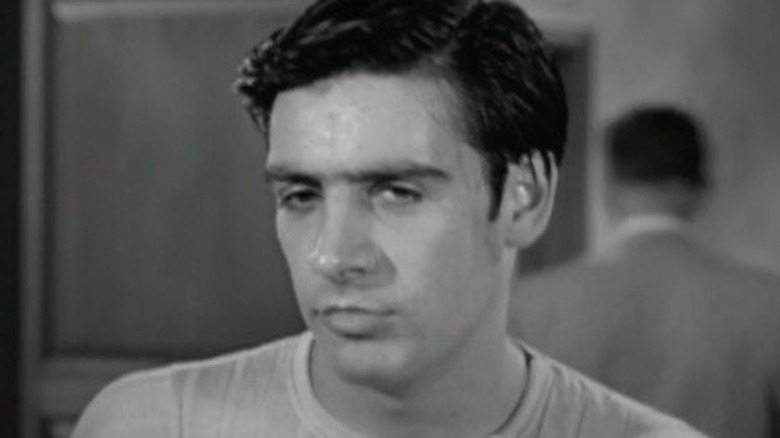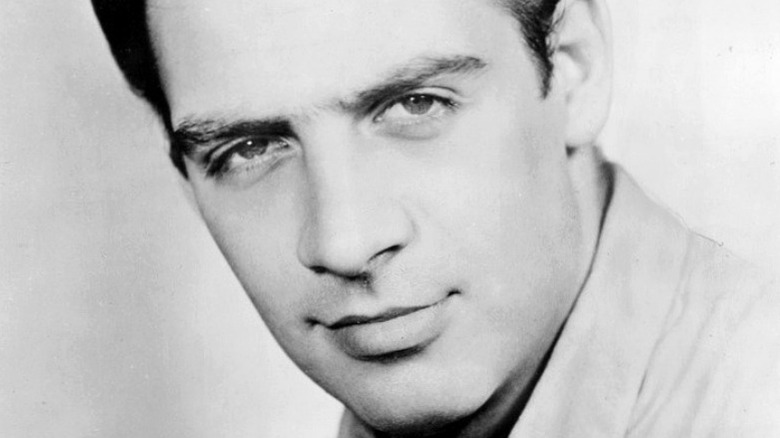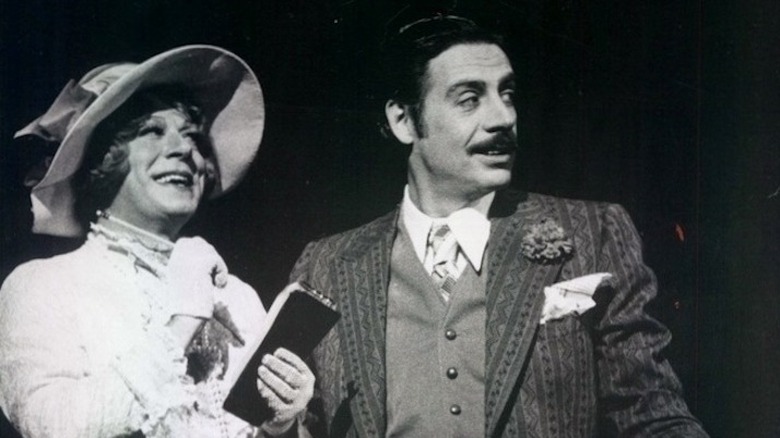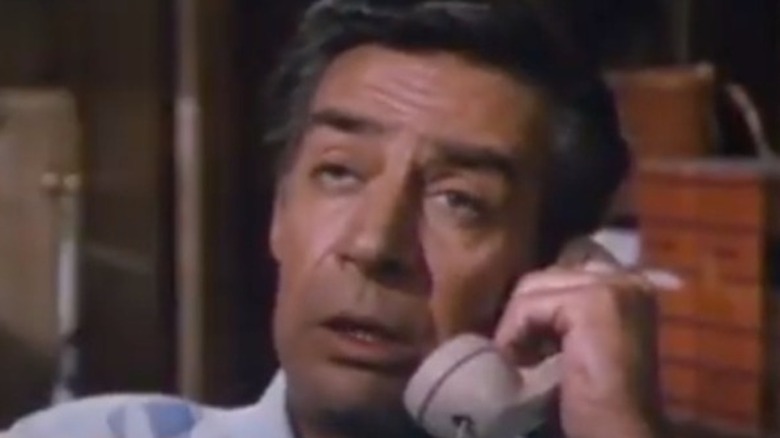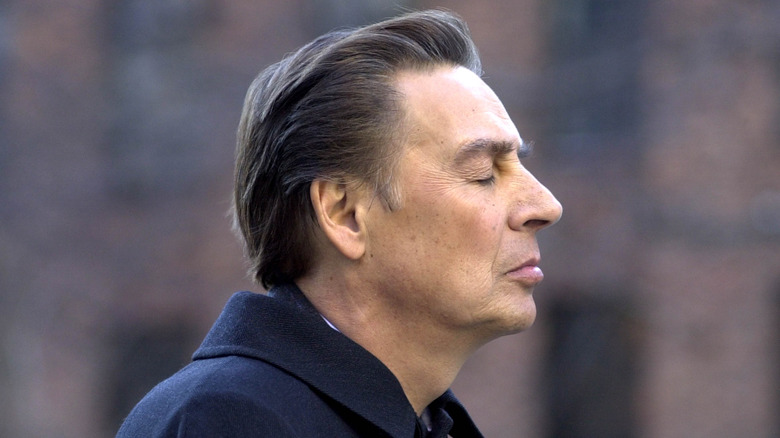The Transformation Of Jerry Orbach From Childhood To Law And Order
Practically everybody knows the name Jerry Orbach. But how well do we really know the man best remembered for his long-running role on NBC's "Law & Order"? From 1992 to 2004, he gave us some of the best years of his acting career as dry-witted Detective Lennie Briscoe. Partnering with Detective Rey Curtis (Benjamin Bratt), Detective Mike Logan (Christopher Noth), and Detective Ed Green (Jesse L. Martin) among others over the years, he scoured New York City for clues that would solve crimes and tell gripping stories.
This was Orbach's gift to us, the viewers. But it was far from the only role he embodied with an aim of captivating an eager audience. How many fans know his journey to becoming an actor began in childhood? The clues to his transformation are out there, and it's only fair we do a little digging of our own now, to pay tribute to this iconic actor.
A kid with a dream and the chops to reach it
According to Biography, Jerry Orbach was born on October 20, 1935, and started out life as an only child in the Bronx. His dad was a restaurant manager who'd previously tried his hand at vaudeville. His mom was a greeting card manufacturer who'd once spent time working as a radio singer. Performance, it seemed, was in his blood — even if it hadn't become a longtime career for either of his parents. This may explain why they always supported their son's dream of becoming an actor.
Orbach's family moved around a lot while he was growing up. But he still managed to learn his first acting techniques from his speech teacher. According to Playbill, the family eventually wound up in Waukegan, Illinois, where he settled in during the second half of seventh grade and stayed through high school. In addition to performing and acting in plays, he joined the football team. His first love, however, appeared to be performing, and he showed a natural talent for it, too.
"It was never a decision that I made at a certain point. When I was nine years old, they picked me for the leading role in the school play. I was in the choir, and they sent me down to the University of Illinois for a singing contest, and I won a gold medal. It went on and on," Orbach said. "I think I always knew I was going to be a performer."
For many viewers, their introduction to Orbach came in the 1958 film "Cop Hater," where he played a teenage gang leader. But before that, he spent several years honing his craft while still in school.
And then he went pro
In 1952, Jerry Orbach graduated high school and thanks to his drama teacher, started working in summer stock at the Chevy Chase Country Club, in Wheeling, Illinois (per The New York Times). There, according to Biography, Orbach acted, built sets, and basically learned his way around the professional stage. His time there helped him learn to control his voice and facial expressions for future acting gigs.
Per Biography, Orbach went to the University of Illinois and then Northwestern University for some higher education in the craft of acting, specifically the Stanislavsky method, designed to get actors acting naturally — like real people. But in 1955, instead of starting his senior year, he left college to pursue acting in New York City. It may have been a pipe dream for some, but his plan worked. Orbach then landed an understudy role with the show "The Threepenny Opera" and over the next three years, worked his way up to playing the lead. But it's not as if it all happened by magic. "Working his way up" included continued study. He took classes at The Actor's Studio.
In 1958, he married Marta Curro, also a member of the cast of "The Threepenny Opera." By 1959, Orbach had a paying job with a new off-Broadway musical called "The Fantasticks," where he got to create the role he played, according to "The New York Times." Critics noticed his work and started calling him out as a star.
He tried Hollywood, but Broadway was a better bet
Jerry Orbach stayed with "The Fantasticks" until 1961, then took a role in the Broadway musical "Carnival!" according to "The New York Times." Eventually, he wanted to get into film. He set off for Hollywood as a musical theatre guy with a goal. But transitioning from stage to screen wasn't so simple, and within a few months, he returned home.
The stage welcomed him with open arms. Throughout the '60s, he appeared in "The Cradle Will Rock," revivals of "Carousel," and "Annie Get Your Gun," according to "The New York Times." He won a lead in "Guys and Dolls," which earned him a Tony Award nomination. In 1969, he won a Tony Award for Best Actor in a Musical for his performance in the show "Promises, Promises," according to Biography.
"I just kept going from one show to another, one musical to another, and it was a terrific life," he said (via NPR). "My kids were being born and I was raising a family in New York and all my friends who couldn't sing, who were desperate and out of work and couldn't get a job off-Broadway or anything all went to Hollywood. And some of them became big stars out there. And that's sort of what I wanted to do in the background."
Orbach may not have made it in film (yet), but he'd reached a pivotal point in his personal life. By 1975, he had two sons, but his marriage to Curro was over. That same year, according to the New York Daily News, he debuted a lead role in the new Broadway show "Chicago," winning another Tony nomination in 1976. While working on "Chicago," he met fellow actor Elaine Cancilla. After "Chicago," the pair toured together with the show "Chapter Two." They married in 1979.
His stage skills worked onscreen
Soon after, Orbach's career started moving in a new direction, and he began finding success on the small screen. According to IMDb, he appeared in TV series, including "Buck Rogers in the 25th Century," in 1980, "Trapper John, M.D.," in 1980, and "Ryan's Hope," in 1983. He also won roles in TV movies, including "Alex and the Doberman Gang," in 1980, "Plaza Suite," in 1982, and "The Invasion of Privacy," in 1983.
By 1984, he had a recurring role on "Murder, She Wrote," starring Angela Lansbury. While she took the lead as a mystery author and amateur sleuth, he played private investigator Harry McGraw. The character's career was strikingly similar to the part that would make Orbach famous in the future. And it was a role he relished diving into.
"That was such fun. He was the detective who, when he punches someone, breaks his hand; his car won't start. He was a little funnier than Columbo," Orbach told Playbill, referencing another show from an earlier era.
Next up, Orbach starred in some of the most iconic roles of his career. In 1987, he delivered a memorable performance in the movie "Dirty Dancing" as gruff-but-loving dad Dr. Jake Houseman, who doted on his daughter, "Baby" — and gave her a chilling silent treatment when she disappointed him. Two years later, Orbach played cold-blooded killer Jack Rosenthal, who stepped in when his brother needed criminal assistance in Woody Allen's 1989 film "Crimes and Misdemeanors." And in 1991, he voiced Lumiere in the animated film "Beauty and the Beast."
He left a lasting legacy
In 1990, NBC began airing its original series "Law & Order," basing storylines on real cases ripped from the headlines. Orbach first appeared during the second season playing a defense attorney, according to Playbill. While he didn't debut his role as Lennie Briscoe until the third season, he continued with the show for the next 12 years as one of its longest-running characters. He finally left in Season 14 to pursue a role in the spinoff series "Law & Order: Trial By Jury." He'd also been diagnosed with prostate cancer and was receiving treatments, according to Today. But his illness wasn't expected to derail his career.
According to Playbill, in 2003, Orbach was honored by the Drama League for having appeared in more American musicals than any other living actor. In 2004, he was named one of New York City's Living Landmarks. Appearing on Late Night with Conan O'Brien, he said it made him feel old, but also conceded, "It was great. It was terrific. They made this thing of living landmarks and I guess it means they can't tear me down. You know, like a landmark building."
Orbach died later that year, and in 2005, he was posthumously awarded the Screen Actors Guild's Outstanding Performance by a Male Actor in a Drama Series for his work on "Law & Order." The legacy he left is no mystery. Orbach played a part in some of the best work fans will find, on stage and on both large and small screens.
